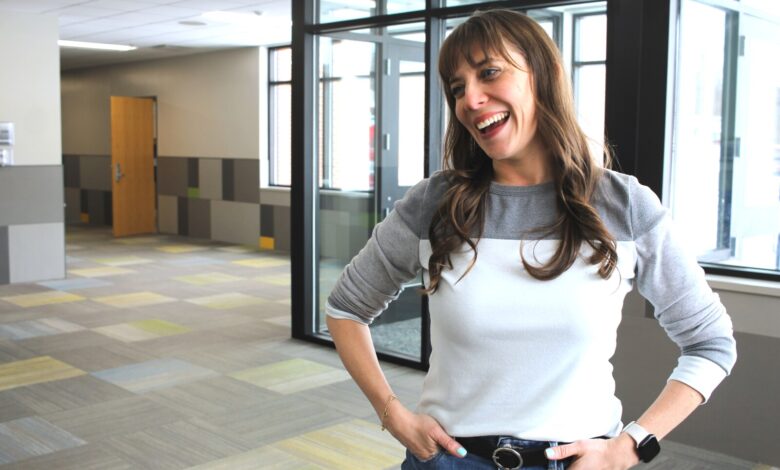Detroit Lakes elementary teacher shares journey with mental health – Detroit Lakes Tribune

— For Teri Holehouse, medicine can be the difference between living a full life, or feeling as if she is being pulled toward darkness. While there are plenty of medicines for those with clinical depression, finding the right one can be a challenge.
Holehouse explained that the body can take several weeks to acclimate to a new medication. If the new medication doesn’t work or has adverse effects, a few weeks are needed to wean off the drug before the cycle repeats with a new medicine.
Last summer, Holehouse went through such a cycle. As the school year approached, the Detroit Lakes Rossman Elementary teacher learned about imagenetics. The new field in pharmacy has the potential to ensure patients are prescribed medicine that will work for them.
, a Pharmacogenetics Clinical Pharmacist at Sanford Health, explained that imagenetics is a relatively new field. On her way to earning a bachelor’s degree at North Dakota State University, the 2010 graduate recalled hearing about it as a futuristic concept.
“Now there is a class (on imagenetics) that they have to take,” she said, noting she is one of the teachers at the college.
Imagenetics, as a specialized field at Sanford, began in 2014. Many studies are underway and planned to understand the scope of information that the new science offers a patient’s clinical team. The goal of imagenetics is to get the patient on the most effective medication, reduce trial-and-error attempts and decrease instances of side effects.
The process begins with a sample (blood, saliva or cheek swab) taken from a patient at any Sanford clinic. The sample is sent to Sanford’s lab in Sioux Falls, South Dakota, where Petry works.
Results from the test predict which medications will offer optimal results based on how a person’s gene metabolizes the ingredients in the medicine. Adversely, the results may also warn of potential medications with an increased risk for side effects or toxicity in a patient.
“It’s a piece of clinical puzzle to use with other clinical information,” Petry said.
While doctors can recommend a patient for imagenetics, there is also a pay-out-of-pocket option. A 14-gene panel costs $320, Petry said.
Holehouse considered her options. When she learned about a trial program at Sanford Imagenetics, she applied. The program requires her to participate in a decade-long study of her journey with mental health medications.
“I’ve had such a well-documented mental health timeline, they said I was a great candidate for this,” Holehouse said.
She went through the process of having blood drawn. The results were then sent to her doctor, who reviewed the medicine list provided to her. She was then prescribed medicine for her depression, and the familiar journey began again. But, this time Holehouse had more hope. And in time, she felt like she was getting back to even — gaining energy, getting quality sleep and feeling motivated.
“I woke up one morning and was like, ‘Wow, I feel really good,” she recalled. “It was just a normal day, but you don’t take those for granted when you have so many dark days.”
Depression rears its head in childhood
Holehouse grew up in rural North Dakota as the daughter of a business owner and educator. During her elementary years, she recalled that three of her four grandparents died. While at one of their funerals, gunshots were fired to salute the World War II veteran.
“When I returned to kindergarten, after one of the funerals, we had a fire drill,” Holehouse recalled. “I took off running out of the building. I ran three blocks away and I climbed a tree. They had a senior from the high school come and get me down.”
More meltdowns followed, as well as an increase in anxiety attacks. Looking back, Holehouse feels confident the consecutive deaths did not cause her mental health struggles, but it did trigger it.
“I started seeing a child therapist when I was five,” she recalled.
Therapy has been a stable, positive experience for Holehouse. She built trusting relationships, learned helpful tools to pull her out of an anxiety attack and more.
“I know that that’s not the case for everybody,” she said, encouraging those who had a less fruitful experience to try again. “I think of it like church; one may go to church and be hurt by the people at church. People hurt people sometimes. But, that doesn’t mean give up on your faith because of people. It’s the same with therapy.”
After tragedy, therapy, family and God Kept her moving
While attending the University of North Dakota to become a teacher, she met a dashing man named Doug Miller. The two shared experiences from growing up in small-town America and had compatible character traits.
They wed in 2011 and began building their life together in Detroit Lakes. By 2014, they welcomed their firstborn. Years later, another baby was due in February 2017. Their second daughter wouldn’t get the opportunity to meet Miller.
On Sept. 19, 2016, around 11:30 p.m., Miller was traveling southbound on Highway 24 near Ada in his Ford pickup. He just finished golfing with friends and was heading home, Holehouse said.
“It was very, very late at night, and he had been up way too long preparing for a presentation that he had finished (the night before),” Holehouse recalled, adding that he drove through a stop sign and was struck by a semi-truck.
Miller, who was 31, was declared dead at the scene.
“It was the day after my 30th birthday,” Holehouse said, adding in the moment she handled the tragedy well. She focused on tending to her child and husband’s family and doing things to avoid dealing with the trauma.
“And then I spiral afterwards,” she said.
When the time came to address the loss, she found a strong team to lean into. From therapists to family and friends, the support helped her regain her bearings in time.
As the calendar flipped, Holehouse opened her heart to love again. Mutual friends brought her to meet a man named Alex Holehouse.
The two married and built a new life with three school-age children: Telyn, 10, Demi, 7, and their youngest, Paul, 3.
Even with a job she loves, “amazing children” and a “wonderful husband,” Holehouse can’t escape depression.
“I have all of those things on paper, but there is another side where I feel like I am a burden to others; that if I was gone their lives would be so much easier,” she divulged.
While her mind tries hard to trick her into believing the lies it whispers, her years in therapy have told her “suicide is a permanent solution to a temporary problem.”
Holehouse recalled a few days after a dark night, she found herself sitting at the dinner table with her family. Like out of a Norman Rockwell painting, each family member was being themselves, providing chatter and laughter.
“I remember sitting there and looking around and thinking, oh my gosh, I love this; I’m so glad I’m still here,” she said.
While therapy gives insight on what not to trust on those dark days, she said God shines the light on who to trust — him.
“One of my favorite verses (in the Bible) is from the book of Romans,” Holehouse said, noting the section speaks on how suffering is a way to build character and gain endurance that helps one persevere.
“And then, in that character comes hope, and we’ll never lose that hope because Jesus has proven that he’s not going to leave us suffering and destitute and alone,” Holehouse said.
Being open with her mental health journey has taken courage. Through that courage, many people have reached out to share their own struggles.
“We’re all just trying our best,” she said.





